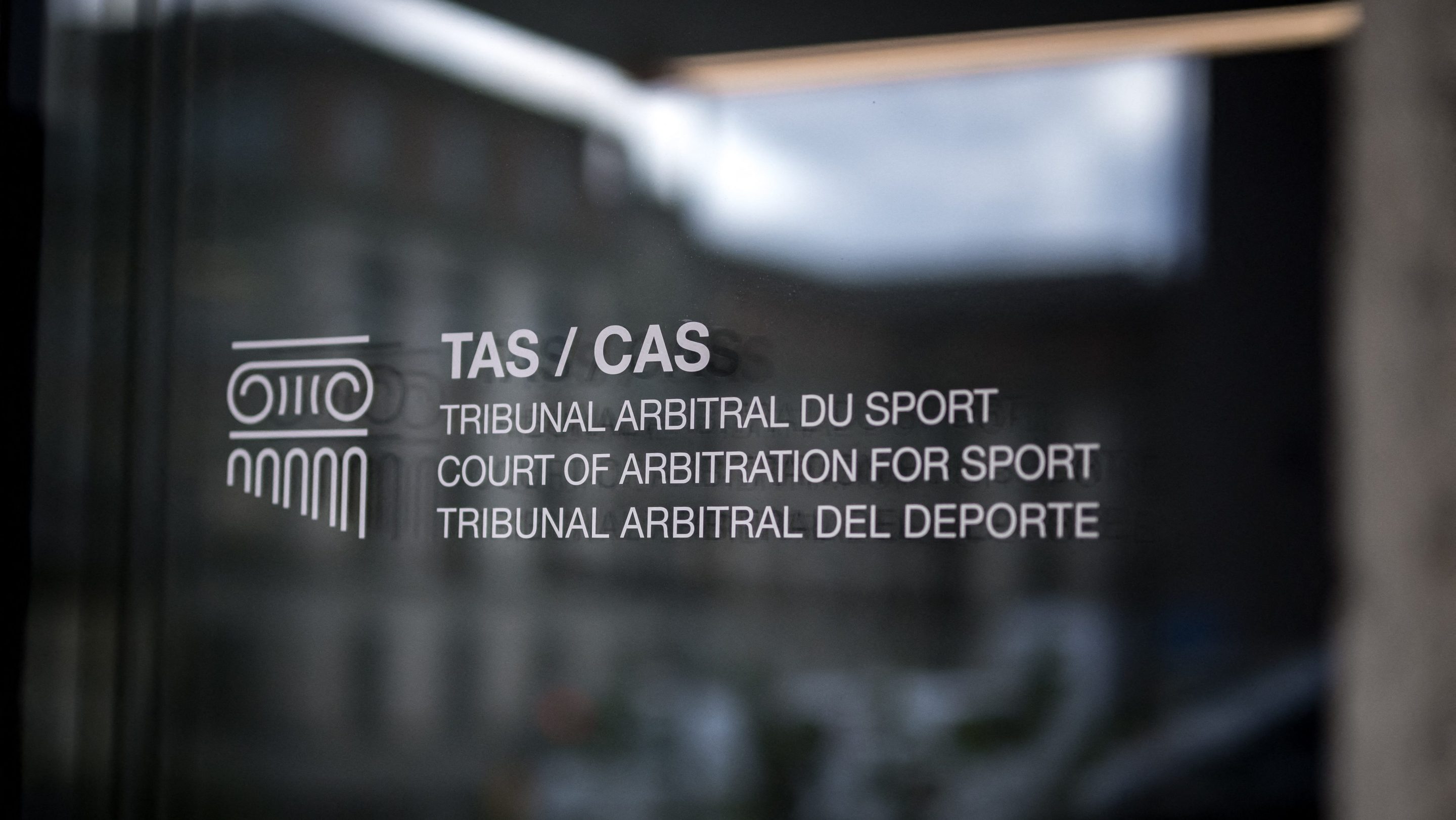The Court of Arbitration for Sport released its detailed report Wednesday on why it ruled that third place in the women's gymnastics floor competition at the Paris Olympics now belonged to Ana Barbosu of Romania—and not Jordan Chiles, who actually received the bronze medal at the event and stood on the podium. The 29-page document goes into great detail about how and why the three-person panel ruled in favor of Romania and not the United States, but the clearest takeaway of all is that the people in charge of international gymnastics and sports, in this situation, behaved like idiots. They might or might not know how to notify a person that their medal is being challenged; they can't fully tell you how their own inquiry system works or even tell you who accepts those inquiries. They will acknowledge an obvious solution—give Chiles and Barbosu each a bronze—and opt instead for an opaque and obscure administrative conflict that leads to gymnasts getting harassed online.
The one exception to this is the Romanian Olympic and Sports Committee, which maneuvered deftly through the proceedings and got one of its gymnasts her own bronze medal. Otherwise, more or less every person and institution involved here left with some level of humiliation, CAS itself very much included.
What follows comes from CAS's description of its own proceedings. Sally Jenkins dove into CAS's long history of corruption over at the Washington Post—she called them the "illegitimate warren that the International Olympic Committee, oligarchs and other dealers in suitcases of cash use as a legal veneer"—so I won't spend a lot of time belaboring that here. The document also does not include any source material; no full transcripts or copies of exhibits were included. The snippets of dialogue and evidence that appeared did so without full context. This is CAS's narrative of what happened:
Three Days Passed Before CAS Told The U.S.
On Aug. 6, a day after the floor final, Romania filed two applications with CAS. They named only one person as a respondent, Donatella Sacchi, the president of the women's artistic gymnastics technical committee for the Fédération Internationale de Gymnastique, aka FIG. CAS determined that Chiles, USA Gymnastics, and the U.S. Olympic and Paralympic Committee should also be named, and "notified" them. Or, anyway, CAS thought it did.
Christine Brennan previously reported in USA Today that CAS did not reach out to the right U.S. officials, and that bears out in CAS's own document. Per its own timeline, CAS did not establish contact with the U.S. until Aug. 9, when the court noted that it had not heard back from Chiles, or USAG, or the USOPC, and asked FIG for USAG's contact information. They established contact with the USOPC at 10:23 CEST on Aug. 9, after three days of legal action had taken place without any input from anyone representing Chiles or the U.S. How did this happen? Who screwed up the initial contact? Why did it take three days for CAS to remedy it? These are not questions the official CAS document answers.
Instead, CAS gets into why it felt that it needed to move so quickly on the matter, which was because the IOC asked it to do so. The IOC told the court it would not make any submission and also felt "it would be both preferable and consistent with the purpose of the CAS Ad Hoc Division that a dispute concerning an event that took place on 5 August 2024 be resolved before the end of the Olympic Games." CAS, which was created by the IOC, did as it was told and hurried along.
Now that it knew what was happening, USAG requested an extension. They got one—of a few hours. The deadline for comment had been 18:00 CEST. Now, CAS said, USAG and everyone else could have until 20:00 CEST. The hearing remained on schedule for the next day, Aug. 10, at 8:00 CEST.
FIG Doesn't Know Who Logged The Inquiry
The same day CAS got in touch with the U.S., it also circled back to FIG on a key question: Who received the inquiry about Chiles's score?
A brief reset will make clear why that matters. After Chiles competed on the floor, her initial score put her in fifth place. Barbosu sat in third. When her score appeared in the arena, Chiles's coach, Cecile Landi, filed an inquiry to the judges, which is allowed; think of this as a football coach throwing the challenge flag. After the inquiry, the judges reviewed one of Chiles's elements, a Gogean, and boosted her score by 0.1, moving Chiles from fifth to third and bumping Barbosu off the podium. The crux of the Romanian argument is that this inquiry shouldn't have been allowed because it came after the one-minute time limit, a rule that only applies to the last gymnast to compete. (Every other gymnast gets up to four minutes, per FIG's rules.)
So it's easy to see why testimony from the person who accepted the inquiry would be critical. But FIG said they had no idea who that was, because that person was appointed by the local organizing committee. "As this person does not hold any official judging position, her/his name does not appear in any FIG official documents," the CAS report said.
This would come up again at the hearing, which took place the next day. Sacchi, president of the technical committee for women's gymnastics, said this person "was not an employee of FIG and could not in fact be identified by name." She would later give this answer as to why she didn't know, presented here as it was given in the CAS report:
The name I don't know honestly because these, at the Olympic Games, there are a group of people called NTOs (National Technical Officials) that are appointed by the local organization. When I received the complete list of people. I check that they have the international judges brevet for that competition, then [it] is up to local organization to assign the people to the different functions. So there is one group that is working as real judge place on the line and time. And these, they these give me the names and they appear name in the judge's panels. And there is another group that is we call assistant that are the secretaries, the person putting the vault [?] numbers, and two persons as an inquiry officer. They receive instructions from Omega. It not me taking care of them. So if you want to know who is this person, you need to ask to the local organizers.
CAS would write that its panel was "surprised" by this, but does not take it any further than that. Is this normal for an international gymnastics competition? A situation unique to the Olympics? Did anyone reach out to the local organizer to ask if they had a record of who this person was? And had this person been told about the one-minute rule for the final athlete? All are questions that CAS does not raise. Once again, CAS moved along.
How Does This System Even Work?
The USOPC did not attend the Aug. 10 hearing, and CAS said it did not receive an explanation as to why.
As recapped by CAS, that hearing focused a lot on the system used by FIG. It's often referred to as Omega, which says on its website that it is the official timekeeper of the Olympics, or the Omega system. But beyond the name there is very little explanation in the CAS recap about how it works and where it ends. It's Omega. It's official. That's it.
And according to Omega, the Chiles inquiry request came in after one minute and four seconds. At the hearing, CAS said that Landi testified that the person who registered the inquiry entered the information "immediately." (As fancy as Omega sounds, it seems to still rely on human input.) At the hearing, USAG did not fight the one minute and four seconds timeline—they've since said they have video evidence showing Landi submitted the inquiry in just 47 seconds. But at the hearing, which they appeared to be aware of just a day before it happened, they focused on a different line of defense. More on that later.
FIG's Sacchi said she got the Chiles inquiry request on a tablet and proceeded with it because there was no indication that it had been late. It had no "red flags," she said, per CAS's document. Sacchi also said that, if she had known it was filed past the one-minute window, "she would not have proceeded to conduct the inquiry, and would have consulted with, or sought the opinion of, her supervisor."
"So in that moment I assumed that the system didn't block the verbal inquiry
because [it was] out of the limit," she testified, per CAS. "So I saw the written inquiry and I said. Okay, it means it's okay. I proceed because I cannot control the timing of the inquiries and the difference of the timing."
The CAS panel had more questions for Sacchi, which she could not answer:
The Panel put numerous questions to Ms. Sacchi regarding the process whereby an inquiry was filed, including information as to how the monitoring that the inquiry was submitted within the 1-minute window took place, and who was responsible and in charge of such monitoring, and in particular whether it was (i) the OMEGA electronic system; and/or (ii) Ms. Sacchi’s superior; and/or (iii) any other person. In response to these questions both FIG and Sacchi were unable to provide any answers that indicated that any system for monitoring the timeliness of any inquiry was in place.
Here is the official report prepared by Omega:

Sacchi would eventually confirm at the hearing that "the Omega system was not set up to monitor or flag compliance with the one-minute rule." Sacchi could have double checked but she did not. When asked what is in place to ensure the one-minute rule, Sacchi couldn't really answer:
Q: My question was: who is the guardian, the safeguard of the one-minute rule? And you are saying in your answer that the computer processed it, there was no flash, there was no alert. So you are suggesting that it is the computer that monitors the timing and that if it sees out of delay, it's the computer that flashes? Or is it the person that puts it in electronically that judges this?
A: You ask me something difficult, very difficult to answer.
Q: If you don't know, you don't know.
A: No, no, no. I understand, no. We don't know either, so we're trying to find out.
Has it always been this way? For how long has the timing of inquiries not been verified at the Olympics? Years? Why does Omega rely on a human being entering info? Can't we give coaches a button? A challenge flag? Or is this new? Again, CAS isn't interested. Moving along!
USAG Argues The Field Of Play
USAG's defense came down to arguing that the principle of the "field of play" should take precedence. They pointed to a previous CAS ruling, which said, "CAS does not review 'field of play' decisions made on the playing
field by judges, referees, umpires, and other officials, who are responsible for
applying the rules of a particular game," but allowed that "an exception is nevertheless possible if such rules have been tainted by fraud, arbitrariness, corruption or applied in bad faith."
CAS ruled that this ruling was not within the field of play, based on response given by FIG's own counsel during the hearing. Here is how CAS explained:
In response to a question put by a member of the Panel on this issue, as to any default in relation to time monitoring arrangements, counsel for the FIG stated: "If the default is part of the system you have the right to challenge." The Panel understood this as a concession, which FIG counsel confirmed once this understanding was put to it by another member of Panel, to the effect [that] a default in the arrangements to monitor the timeliness of a request for an inquiry could not be considered as a field-of-play decision and could accordingly be reviewed by a CAS Panel.
CAS Issues Its Ruling
CAS dismissed a request by Romania to give gymnast Sabrina Maneca-Voinea a bronze. Her argument had been that she was wrongfully deducted 0.1 points for an out of bounds that didn't happen. The panel said that, while that might have been the case, they can't do anything about it because "an error identified with the benefit of hindsight, whether admitted or not, cannot be a ground for reversing the result of a competition."
But it could weigh in on Chiles's score because "the challenge does not fall within the 'field of play' doctrine and that the same result would in any event be reached should the doctrine apply, as it would then fall under one of its exceptions."
CAS found that the problem was FIG did not have anything in place to ensure the one-minute rule for the final gymnast was followed. "The failure was the responsibility of FIG," it noted, not one made by Saachi or Landi. And that failure, CAS said, was outside the field of play. FIG's own counsel conceded as much, per the CAS report:
Counsel for the FIG stated: "If the default is part of the system you have the right to challenge." Recognizing the significance of the concession, a member of the Panel recorded these words in writing, read them back to counsel, and inquired if that was indeed the position of the FIG. He replied: "Yes."
CAS then said their review was fair based on the "extraordinary fact-specific circumstances." In fact, the failure "is tantamount to an error of law or de facto arbitrariness."
FIG Opposed Handing Out Two Bronze Medals
The CAS concludes by confirming previous reports that Romania had suggested handing out more bronze medals, but others said no. Specifically, the CAS report confirmed that, to oversee handing out more bronze medals, it would have needed all the parties to agree to that outcome, and that FIG—the same FIG that had been found at fault for all of this—said no.
"In the present case, when presented with an opportunity to agree to a consent award which would make bronze medals available to Ms. Chiles and Ms. Barbosu," CAS said, "the FIG declined to do so."
CAS went on say: "If the Panel had been in a position to apply equitable principles, it would surely have attributed a bronze medal to all three gymnasts in view of their performance, good faith, and the injustice and pain to which they have been subjected, in circumstances in which the FIG did not provide a mechanism or arrangement to implement the one minute rule it established under Article 8.5. If the FIG had put such a mechanism or arrangement in place, a great deal of heartache would have been avoided. The Panel expresses the hope that the FIG will draw the consequences of this case, in relation to these three extraordinary Athletes and also for other Athletes and their supporting personnel, in the future, so that this never happens again."
That is where the CAS record ends. The next day, Aug. 11, USAG said it submitted its video evidence but was told by CAS that they could not reconsider the issue. USAG said it "will continue to pursue every possible avenue and appeal process, including to the Swiss Federal Tribunal, to ensure the just scoring, placement, and medal award for Jordan."
This is the cruelest twist of the knife—a finding that FIG is at fault, in the absence of any mechanism to punish FIG or ensure that it doesn't happen again. Instead FIG will use the power it still has to participate in (metaphorically) stripping Chiles of her bronze and giving that medal (actually, a spare one that is now supposed to be viewed as the real one) to Barbosu. The IOC is part of this process, too—the same IOC that said the CAS had to hurry, because it officially allocates medals. The result is a feedback loop of bureaucracy that ignores the very spirit of sportsmanship that the Olympics allegedly celebrate and, ultimately, lands on a solution that makes everything worse.
Which, incidentally, is why the podium from that floor medal became such an iconic moment. When Chiles and her teammate, Simone Biles, bowed down to gold medalist Rebeca Andrade of Brazil, it symbolized the sportsmanship that so many people crave from the games. In that moment, Olympic gymnastics rose above the obscure rules that increasingly weigh down sports; they did something undeniable and unmistakably authentic. When a mistake was discovered, the easy and obvious answer—just hand out another bronze—appeared. The wronged party, Romania, even offered it. But the Olympics could not help itself, and chose another path. When given the opportunity to practice the sportsmanship they preach, FIG and the Olympic movement said, "Nah."
The full document from CAS is below.






